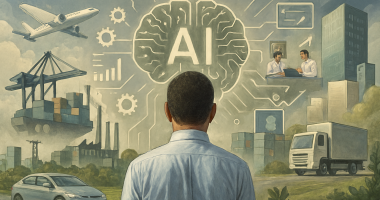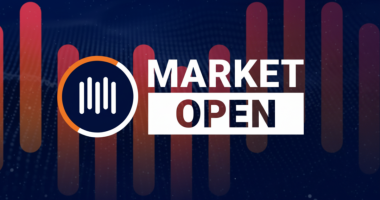The following is a transcription of the above video, and The Market Herald Canada has edited it for clarity.
Artificial intelligence continues to make headlines as it revolutionizes the world around us.
As an investor, how do you even begin to wrap your head around something this huge? AI is all around us. It’s in our shopping apps that present us with our preferences, our map apps that give us the fastest way to our location, and those are just a couple of examples of how AI has become part of our everyday lives.
Previously, I sat down with Kevin Matsui, managing director of CARE AI at the University of Guelph. He discussed opportunities in artificial intelligence, how AI is being used in mining and healthcare, as well as where we are on the artificial intelligence adoption cycle.
Matsui: Well, I would say, like we’re fairly early in terms of AI or conscious AI adoption or because I think people have been using AI behind the scenes in many areas that obviously have lots of data – the financial services, manufacturing, retail, (have) a lot of things happening behind the scenes.
But people are now interacting with AI in a way that they were not accustomed to previously. Certainly in Canada, the banks have been very aggressive in terms of adopting AI and also acquiring AI technology companies to add to their portfolio of technology that they incorporate into what they’re doing.
So I would say if you think of the banks and being … so important in Canada. Banks have been very aggressive in terms of adopting AI technology, funding R&D, but also acquiring AI startups that have unique technologies as well to incorporate.
TMH: And is that just because that’s where they see the growth cycle is going? And, what does that growth cycle look like if we are in our infancy right now?
Matsui: Well, I think it expands across different interesting industries rather but, like, if you think of the history, like, financial services has always been interested in fraud detection, these types of activities, looking at their margins and looking at different types of activity based on a lot of data to begin with.
So that’s sort of a natural extension of their current activity and long history of that, but it’s obviously spreading to different types of industries and evolving even within those (industries).
TMH: And for investors, where can they look for early adoption and what questions can they ask?
Matsui: Well, I, I think it depends what they’re looking at if they’re making private investments into startups and things like that. It’s the typical things like the strength of the team, but also, unique to AI is the idea that people’s training data, that’s in combination with the domain expertise that they have and just the strength of the technology and the people that they have are all sort of key ingredients.
I think from a competitive standpoint, a lot of the activity is around, still around big tech in terms of, either like NVIDIA in terms of the GPUs that they’re producing. There’s quite a huge (amount of) lead time and getting some of these systems, and (what) is the size and scope of resources required to develop some of these models and things like that.
It’s really, giving big tech a bit of an advantage just in terms of the amount of resources you need both … from a human resources standpoint, but also in terms of access to computing and resources. It’s sort of a situation where, you know, big tech has a significant advantage, but there are certainly startups and other activity around customized applications of artificial intelligence.
So, lots of different growth areas and, just sort of the same sort of typical things that people would look out for in terms of their investments.
TMH: As far as implementation goes, what do you think will pose the greatest challenge: the cost of implementation, lack of training, data privacy concerns or regulatory hurdles?
Matsui: I really think it’s implementation or lack of vision on the strategy side that people don’t really understand why they’re implementing an AI solution. They’re just sort of, being a copycat and sort of thinking, well, we need to have AI because, you know, company X has AI.
But without a, without a sort of a strategy or vision to what the AI is supposed to deliver, I think that impacts the implementation, the overall planning and resourcing of projects. And to be successful, you know, you can’t do that in a sort of in a vacuum without the proper resources and without having a proper strategy around that, you know, certainly (because of) the shortage of skilled personnel.
TMH: And how is AI being used in mining, and what are the areas that would help the mining industry to be more efficient, especially as we head towards the need for more battery metals?
Matsui: Sure, like, in terms of mining, (there are) lots of different applications of artificial intelligence. And, you know, some of it, it’s (a) real benefit because of the remote locations of these types of things where mining occurs.
But obviously in things like predictive maintenance, for the really large dump trucks and these types of … these are, I don’t know, like 5 or 6 million trucks that they are using. So, making sure that you’re not suffering a lot of downtime because you’re using AI for predictive maintenance, certainly on the exploration side as well.
There’s so much data available and it’s hard to sort of analyze it with the limits of your human resources and the capacity to do that. There’s a real efficiency of using AI for that type of analysis as well, in terms of processing minerals. A lot of computer vision is being used for that standpoint, you know, for sorting and for other types of examination of the sort of raw materials as you process those.
TMH: Where are we in healthcare in terms of AI? Where do you feel that it’s being used proactively? And where is there room for growth?
Matusi: Well, I think certainly a lot of the activities around medical imaging, interpreting CT scans, MRIs, X-rays, all these type of activities. I think that’s very encouraging if you look at the performance of those and, making that type of capability more widespread, maybe helping with early detection, (and) more accurate diagnoses as well.
So I think that’s well on its way. But I think if you look at overall workflows, patient monitoring sort of improving and making healthcare a little bit more efficient, there might be ways to use more AI systems in terms of a processing of the administrative side as well. … It also represents a large cost in the healthcare system as well.
So, you know, I think it’s encouraging in terms of what’s been done on the medical imaging side. But I think if you look at overall patient flows and reducing waiting times and all of these types of activities from an overall process flow standpoint, these might be exciting areas for AI to make a contribution and improve … healthcare, which is, you know, so important to everybody, really.
For more check out The Market Herald’s Insider Investor Report, AI, the Ultimate Disruptor, which presents three specific niches of AI development for investors in technology, healthcare, and mining.
Click here to download the in-depth AI report.
For another dive into AI, check out another interview with Kevin Matsui, ‘Is Ai innovation too fast to keep us from being outsmarted?
Join the discussion: Find out what everybody’s saying about public companies and hot topics about stocks at Stockhouse’s stock forums and message boards.
The material provided in this article is for information only and should not be treated as investment advice. For full disclaimer information, please click here.



